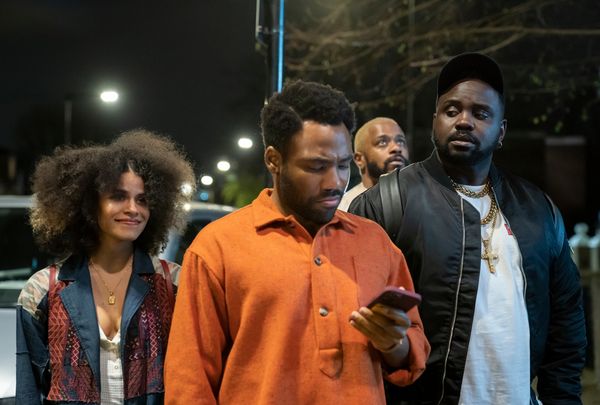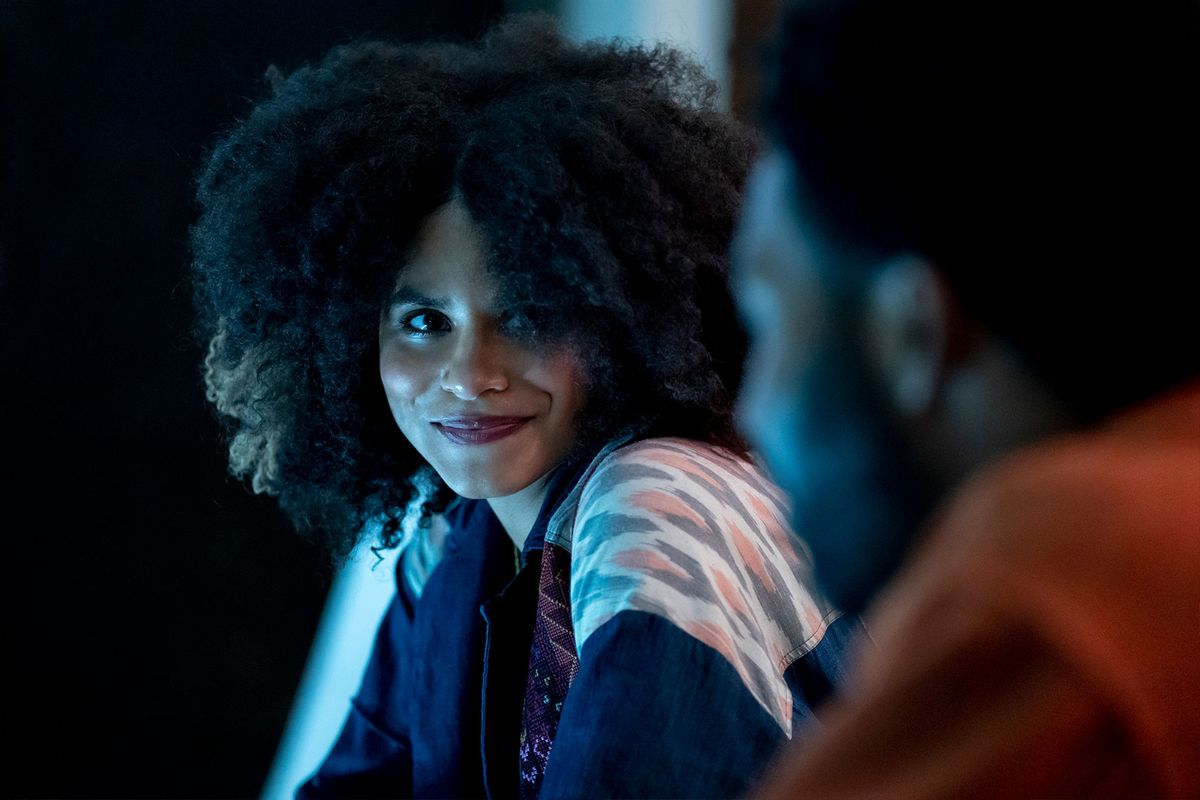Our "Atlanta"-sponsored European safari stops in London this week, where Earn takes Darius, Alfred and Van to a house party thrown by white guys with more money than Jesus or Ye. These soiree-centered episodes produce some of the show's most incisive comedy; "Juneteenth" set that bar in the first season by flambéing the Black bourgeoisie's absurd class snobbery and assimilationist aspirations.
But "The Old Man and the Tree" is next level, in the way it recalls that previous installment while granting absolution to its greatest offenders. There's garish suburban McMansion wealth, and then there's the type that obscures its entrance with a decoy house, by requiring guests to traipse through a run-down horror to breach its inner sanctum.
Upon entering this .01 percenter's hyper-modernist lair, Darius (LaKeith Stanfield), Alfred (Brian Tyree Henry) and Earn (Donald Glover) become their own capsule of wealthy white colonialist tension.
RELATED: This Juneteenth, "Atlanta" will give you all the insights you need on how America co-opts a holiday
Darius is ensnared into a white guilt melodrama resulting from a small misunderstanding with an Asian
"Black guys love Asian women," she blurts
woman at the party who mistakenly assumes he's hitting on her, when what he actually wants is for her to pass a bottle of gin. She nervously apologizes, explaining she gets approached by Black men a lot. "Black guys love Asian women," she blurts, and Darius sees no reason to take offense. A white savior idiot who overhears that remark disagrees, blowing up this miniature conversational faux pas between two people of color into an All Lives Matter war crime.
Alfred gets snagged by the reclusive host of this get-together, a guy called Fernando (Daniel Fathers). Alfred's already convinced he's found paradise – Fernando's hideaway has its own Nando's chicken joint, for crying out loud, and he's not even that Nando! He's a much wealthier Nando willing to pay for having its PERi-PERi sauce on demand, So when Fernando asks Alfred if he likes trees, Alfred thinks he's being invited to smoke a joint. Why not? He's Paper Boi, and this is heaven.
Instead, Fernando escorts his famous guest to the ancient tree around which he's built his hedonistic castle. The evening only plummets from there.
 Zazie Beetz, Donald Glover, LaKeith Stanfield and Brian Tyree Henry in "Atlanta" (Oliver Upton/FX)Blissfully separate from this madness, thank goodness, is Van (Zazie Beetz). The latest "Atlanta" episodes find Van tagging along for Paper Boi's European tour to take some time for herself and figure out her place in the world. Hence, while her gala partners are being drawn into slow-boiling disasters, Van passes the evening unperturbed.
Zazie Beetz, Donald Glover, LaKeith Stanfield and Brian Tyree Henry in "Atlanta" (Oliver Upton/FX)Blissfully separate from this madness, thank goodness, is Van (Zazie Beetz). The latest "Atlanta" episodes find Van tagging along for Paper Boi's European tour to take some time for herself and figure out her place in the world. Hence, while her gala partners are being drawn into slow-boiling disasters, Van passes the evening unperturbed.
Earn brought her, Darius and Alfred to the party to do business with Will (Patrick Kennedy), a middle-aged clout chaser who has taken in, and been taken in by, a talent-free Black British kid posing as an emerging hip-hop phenomenon.
Earn never formally introduces Van to Will, preferring to explain that she's with them as a friend, not an artist. In plainer English, that means she's not worth noticing.
Nobody's looking out for Van – not the hosts or other guests or even her boys, who flee the scene without her when events perilously spin out. Instead of lamenting that, Van takes another route, making invisibility her superpower.
Viewed from a post-"Slap" perspective, however, Van's part is the most liberating.
Taofik Kolade writes the absurd indignities Earn, Alfred and Darius endure in "The Old Man and the Tree" as the episode's starring plots. Viewed from a post-"Slap" perspective, however, Van's part is the most liberating. Beetz may have the fewest lines compared to her co-stars, frequently operating in the background, or captured in long shots. In a peak moment she's nearly obscured in darkness, positioned at the far right of a dark wide framed take.
Still, she pulls our attention by wordlessly owning Van's serenity in the thick this deranged bash.
While Earn agonizes over being loyal to his pal or allowing a young Black "self-taught multi-hyphenate" to continue conning free room and board out of rich white guys, Van simply and effortlessly just happens, observing chaos and creating it. She takes the glass of champagne offered to her on arrival, moseys over to a shelf full of small statues, each likely worth a small fortune, and indifferently pockets one. Later she wanders off to quietly contemplate her tycoon host's captive natural wonder, swaying gently as she appreciates the tree that Alfred could not.
When Earn finally catches up to her, she's standing by a pool and laughing through a conversation with a guy dressed like a boring hedge fund manager. Once the man excuses himself, Van locks eyes with Earn, flashes a coy grin and, without breaking her gaze, pushes a nearby server into the water. She breaks into easy, effervescent laughter. Two white women swimming see the whole thing and laugh too. Even the server laughs as he walks away, soaked to the skin.
If you can't appreciate the relief Van's mischief provides, perhaps you haven't been paying enough attention to her overall arc, or the overlooked perspectives behind last week's cascade of thinkpieces produced in the Oscars' aftershock. Although it might not seem like it, the scripted comedy and live tragedy have a few things in common.
As Earthlings everywhere anxiously worried about Will Smith's and Chris Rock's feelings, did you notice how few articles wondered how Jada Pinkett Smith is faring?
. . . the story could not have been written without us
Mainly it's been Black women expressing concern for Pinkett Smith or the emotional state of any of the women whose names Smith invoked on Oscar night. Nearly everyone else inquired about her alopecia and stopped there. That lack of empathetic curiosity reaffirms the same dusty, damaging cliché about Black women's role in the Book of Life. Rich or poor, famous or invisible, we're presumed to serve the world with all our strength and accept we'll be forgotten in the acknowledgments section, even though the story could not have been written without us.
Want a daily wrap-up of all the news and commentary Salon has to offer? Subscribe to our morning newsletter, Crash Course.
Throughout "Atlanta," this is what Van has meant to Earn, mainly as a matter of sharing the duty of raising their daughter Lottie. As a friend, Van has few peers. She has run herself ragged to bring home a paycheck while he pursued his dream to manage hip-hop artists. When he was broke, she showed up for him. When he's gotten into trouble, she's been there to bail him out.
They've even attended events on Van's home turf where Earn is the stranger, only for her to be introduced as Lottie's mom by her childhood friends.
Now that their circumstances are reversed in some ways, Earn still demonstrates a profound, genuine affection for Van that she recognizes without fully reciprocating. She's lived through far too many disappointments with her child's father, experienced too many times when he's failed to come through or has simply come up short, to comfortably rely on him for anything.
Earn has enough cash and clout as Alfred's manager to take care of Van. But he doesn't do that in the way that counts at the party. Therefore she doesn't take him seriously when he professes to be worried about her.
"I can't have a vacation?" she says in response to his unease, and he agrees with her. He offers to pay for a place for her to stay, to give her money or to call her a car, and she declines. "I'm not Alfred," she says. "I'm OK." Then she rises from her seat to get another drink . . . and pushes another passer-by, this time a white female party guest, into the pool. Nobody laughs this second time around but, whatever. The Invisible Woman gets away with it, because who's really looking?
We may come to find out that Van isn't OK, that she has hit her psychological limit and is truly struggling. We've all been there. Finding that out would also make Earn, Darius and Alfred's thoughtless abandonment of her in London especially infuriating.
But when we catch up with Van after the boys bolted, she is posted up in a late-night Indian joint and
Invisibility has its privileges
enjoying her own company, reading a magazine and long past caring. Her phone buzzes, and she turns it over to see who's calling. Predictably it's Earn, likely doing his very least to look out for her from a distance. She ignores his call, turning her device face down. Invisibility has its privileges.
New episodes of "Atlanta" air at 10 p.m. Thursdays on FX, streaming the next day on Hulu. Watch a trailer for the episode below, via YouTube.
More stories like this:



Shares